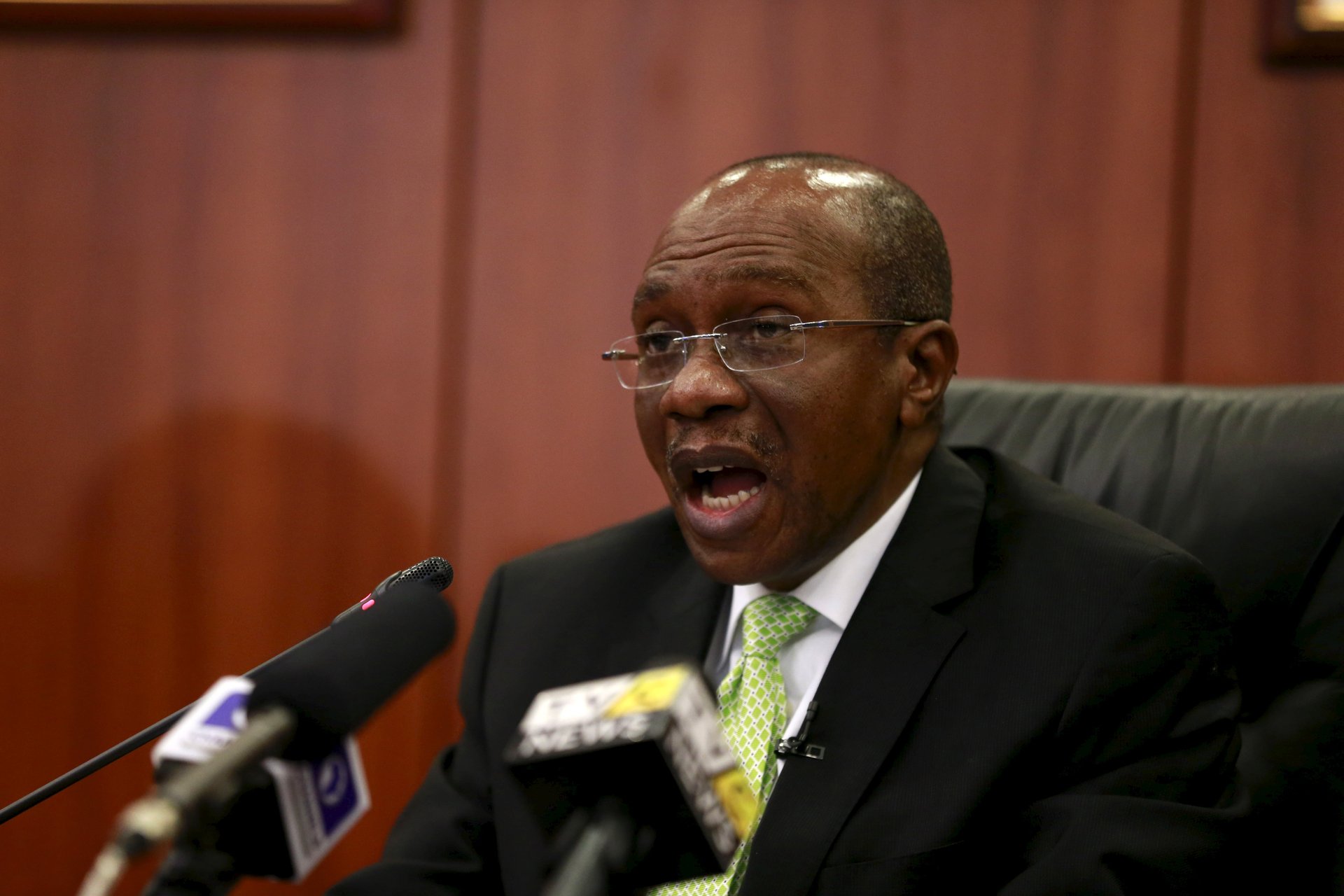Why Nigeria's central bank governor self-exiled abroad?
Emefiele has allegedly been on the run, hiding away abroad for fear of being arrested for allegations of corruption and terrorism financing in Nigeria

Nigeria’s central bank governor Godwin Emefiele had been away from his home country for several weeks, reportedly self-exiling in an unknown country outside Africa.
Though the apex bank announced that he has resumed his duties (pdf) on Jan.16, without confirming whether he is back in the country, Emefiele has been alleged to be hiding to evade arrest by the country’s secret police over claims that he has been involved in corrupt activities and terrorism financing.
His absence raised eyebrows after he failed to turn up to explain the reason behind the redesign of Naira banknotes and cash withdrawal limits without consulting the finance ministry on Dec. 22, delegating that to deputy governor Aisha Ahmad. The redesign has been weakening the currency.
The case against Emefiele
At the time, he said he was hospitalized abroad, before it was reported that he was on the run to avoid being detained for economic crimes and threatening national security. Secret police want to hold him in a 60-day detention, which could be renewed for another 60 days pending investigations.
Emefiele went on leave before Christmas with the knowledge of President Muhammadu Buhari but on Jan. 15, he said he could not come back to Nigeria because he was sick and undergoing treatment.
“First of all, he was accused of financing terrorism worth billions of dollars trough some secret accounts allegedly supervised by him,” Janet Faden, an independent journalist based in Jos City, Plateau State and who runs Plateau News Online tells Quartz. She believes that his devaluation of the Naira right before the upcoming elections is not a coincidence.
In 2014, former central bank governor, Alhaji Sanusi Lamido was also accused of financing terrorism. “They made a show out of it but nothing tangible came out of the investigations. He sued them instead,” Faden says. Armed bandit attacks in Nigeria led to the loss of 2,600 lives in 2021, an increase of over 250% from 2020.
The Department of State Services (DSS) remains alert to arrest Emefiele on sight, despite a De. 29 ruling by Justice Maryam Hassan of the Federal Capital Territory High Court in Abuja quashing the move by the DSS because it provided no concrete evidence to back up its allegations.
The court acted in response to a suit filed by a Nigerian civil society group, the Forum for Accountability and Good Leadership. Pressure has been piling from the country’s law society for the federal government to stop plans to arrest the governor.
“Has the government considered the enormous implication of the effect of a wanted governor of the central bank on the economy? I am completely flabbergasted that the president of the country has not intervened; either to call the state security to order or to call Emefiele to return to the country or be fired,” human rights lawyer Femi Falana said.
This has drawn attention from the Africa Continental Free Trade Area (Afcfta) Roundtable, with founder Warmate Jones Idikio telling Quartz that the absence of the governor of the central bank of Africa’s biggest economy “leaves room for a lot of speculation.”
Nigeria is at risk
While fiscal policy, anti-inflationary measures, the strength of the Naira, and the general economic outlook for Nigeria may not be affected by the absence of the governor according to Idikio, Nigeria risks being blacklisted by global financial bodies, according to the Center for Financial Surveillance and Illicit Transaction Tracking Group (CSITT).
“We received with disappointment the reports of discovery of a suit secretly filed by the state security service wherein it accused Godwin Emefiele of terrorism financing as well as other crimes it described as economic crimes of national security dimension,” reads a statement by CSITT.
It claims that the plan to arrest the governor is motivated by “political and pecuniary reasons” and is “against the ethics of the Egmont group” which blacklisted the country in 2017 for “lack of a legal framework and autonomy.”
Emefiele wanted to be Nigeria’s president
Last May, Emefiele was forced to drop his presidential ambitions after a high court in Abuja dismissed his request to not be prevented from contesting in the upcoming Feb. 25 elections.
He has been labeled Nigeria’s worst performing central bank governor in history for spearheading the implementation of unfavorable monetary policies that Nigerians feel have been hurting them.
In 2019, Emefiele could not explain how Nigeria’s treasury lost over $2.5 billion meant for the procurement of arms under his watch but was still reappointed as governor by president Buhari.
For now, Nigerian authorities may allow Emefiele back to the country without being arrested but he might be forced to resign from his position as allegations against him continue to tarnish the reputation of the country’s central bank.
